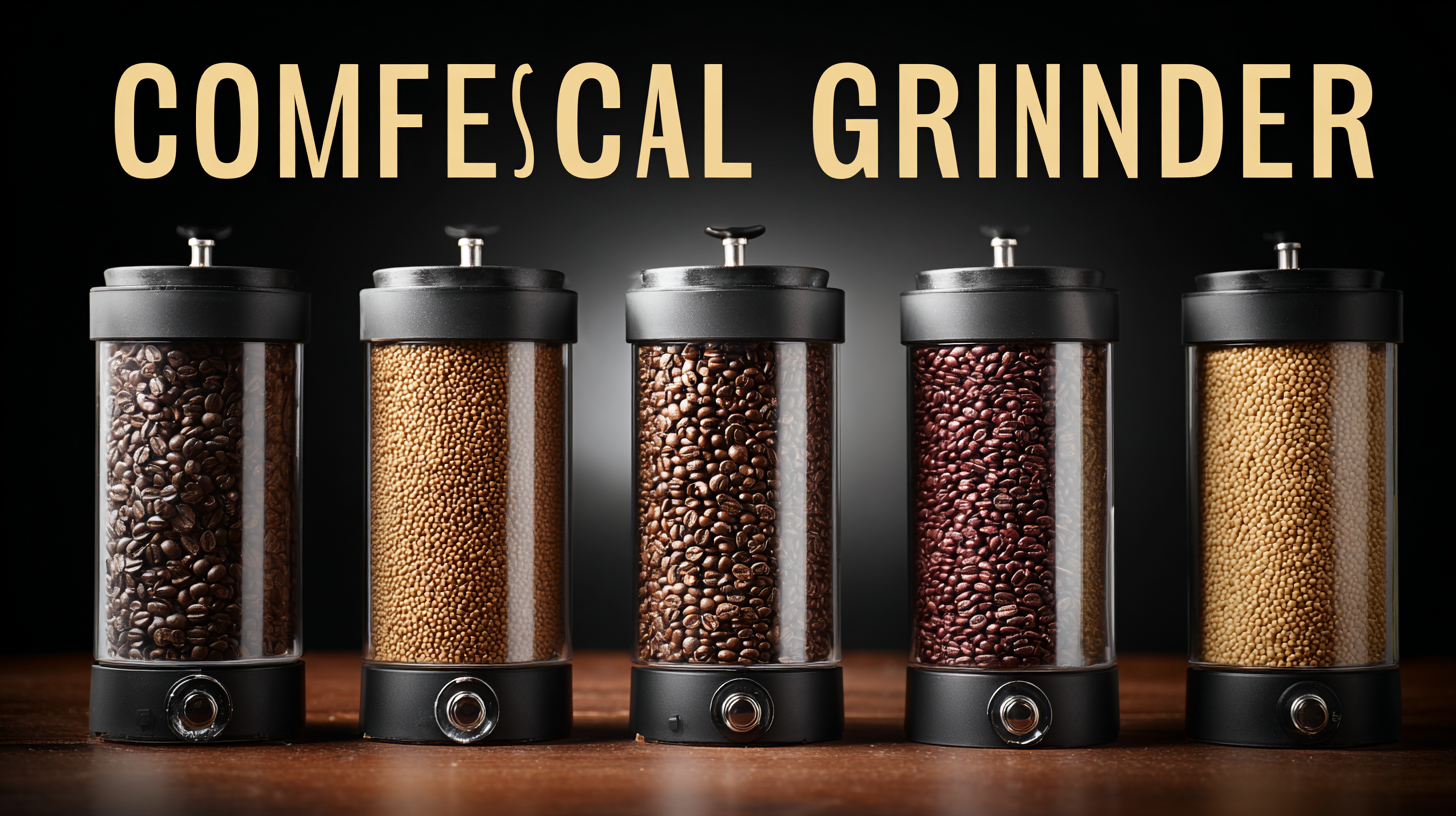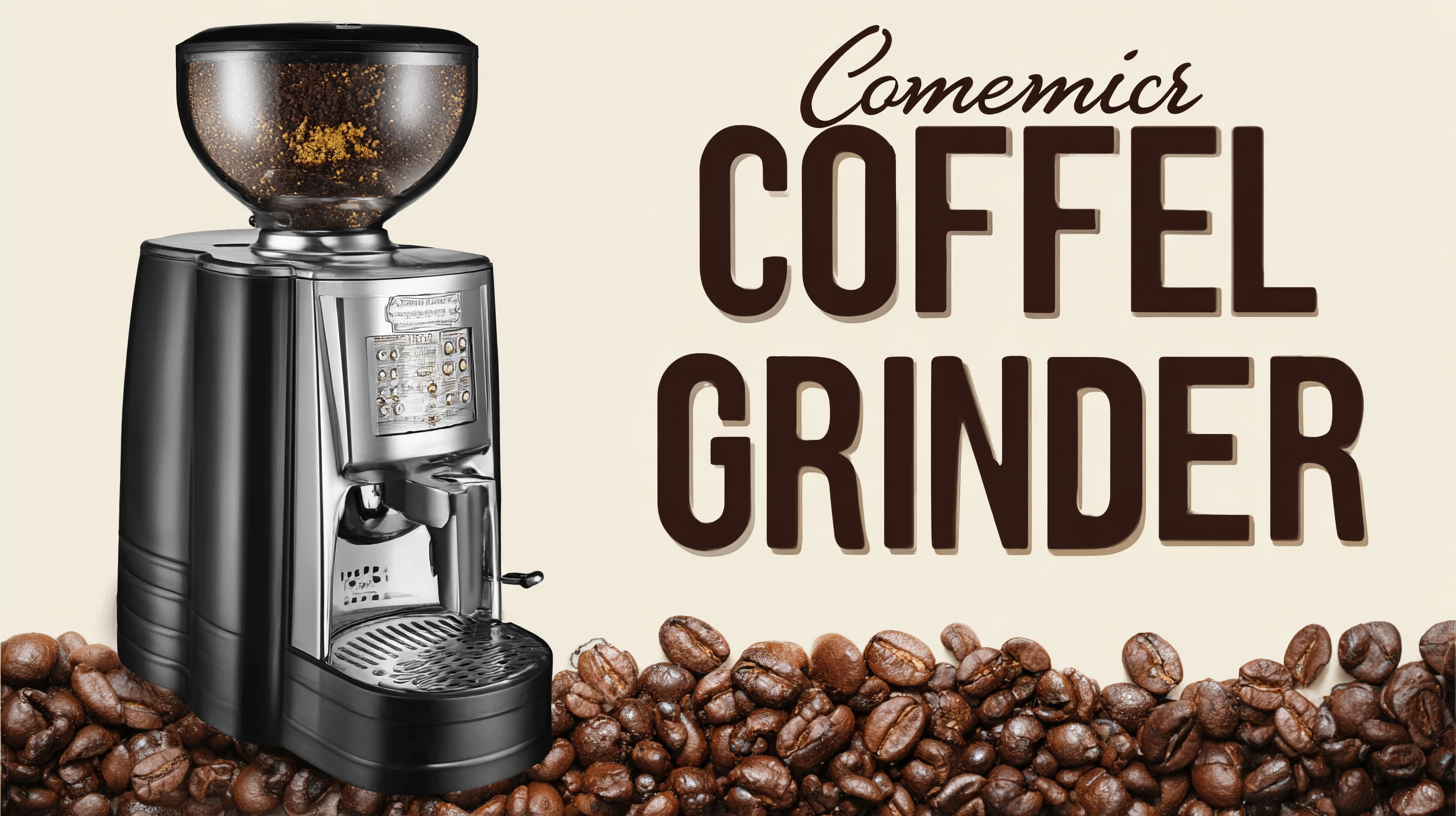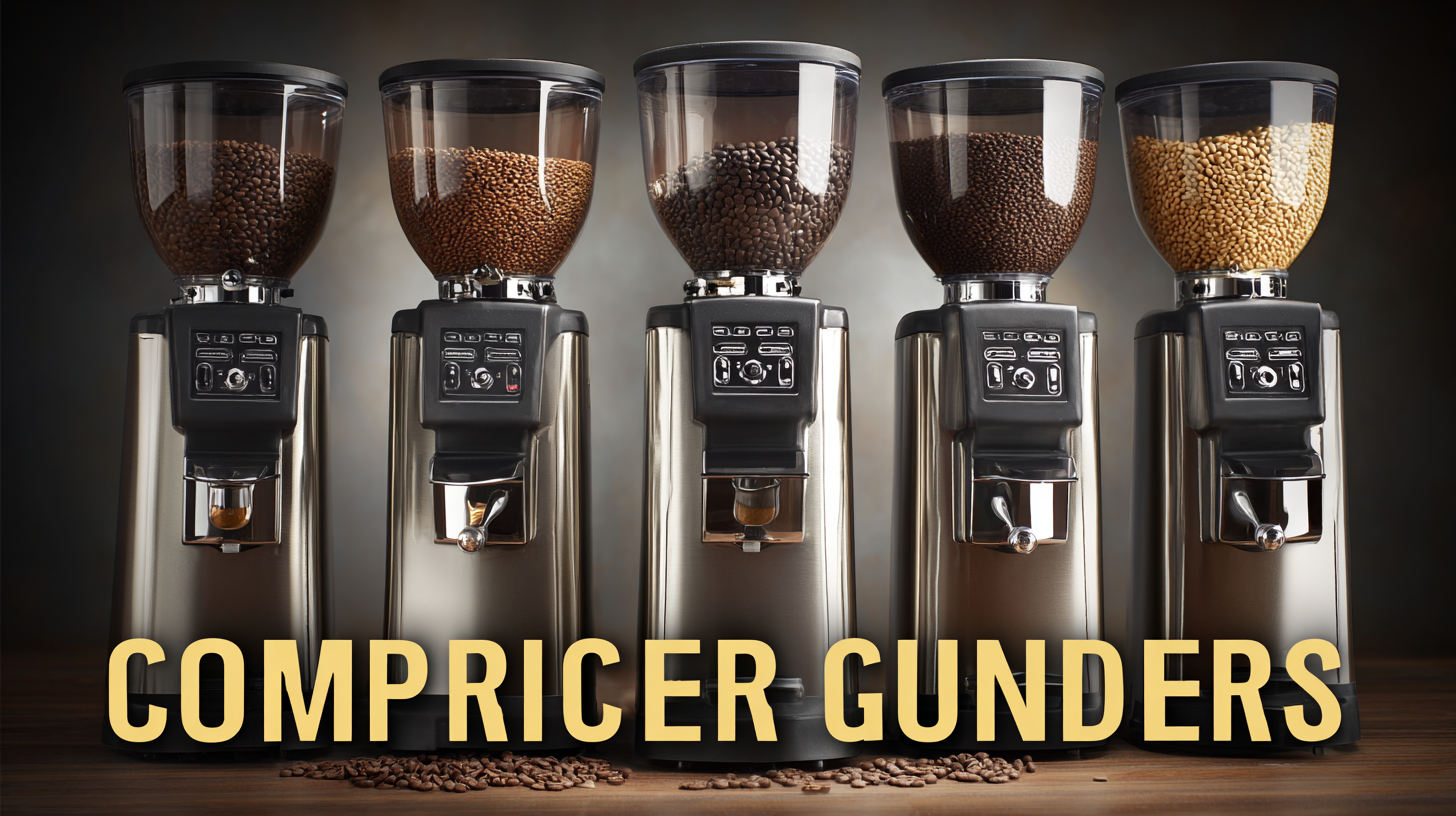Leave Your Message
-
Phone
-
E-mail
-
Whatsapp
-
Whatsapp


In the ever-evolving world of coffee, selecting the right equipment is crucial for ensuring the quality and consistency of brews that satisfy customers and drive sales. Among the essential tools in any café or coffee shop is the Commercial Coffee Grinder, a device that significantly impacts the flavor profile and aroma of the final product. According to a recent report by Market Research Future, the global commercial coffee equipment market is projected to grow at a compound annual growth rate (CAGR) of 5.4% from 2021 to 2027, driven largely by the increasing demand for high-quality coffee and the rising number of cafés worldwide. As businesses aim to elevate their coffee offerings, choosing the right Commercial Coffee Grinder can make all the difference. This blog will provide a comprehensive comparison of the top picks in the market, helping you make an informed decision that aligns with your business needs and customer expectations.

Choosing the right commercial coffee grinder is crucial for any business that thrives on delivering quality coffee. When evaluating different options, the first key feature to consider is the grinder's speed and grind consistency. A grinder that operates too quickly may produce uneven grind sizes, which can affect extraction and ultimately, flavor. Look for grinders that offer variable settings, allowing you to achieve the perfect grind for different brewing methods, from espresso to cold brew.

Another important factor is the hopper capacity and ease of use. A larger hopper means less frequent refilling, which is essential during peak hours. Additionally, a grinder with user-friendly controls can streamline the day-to-day operations of your staff. Lastly, consider the build quality and durability—commercial environments require robust equipment that can withstand constant use. Stainless steel construction is often preferred, not only for its longevity but also for its ability to maintain the freshness of your coffee beans. Prioritizing these features will help ensure that you select a grinder that meets the demands of your business while delivering top-notch coffee.
When it comes to selecting a commercial coffee grinder, understanding the performance and durability of top brands is essential for any business that relies on high-quality coffee. A recent report by the Specialty Coffee Association reveals that a significant 55% of cafés prioritize grinder quality over other equipment when establishing their operations. Brands such as Mahlkönig, Baratza, and Bunn emerge as frontrunners, noted not just for their precision and grind consistency, but also for their longevity and ability to withstand the rigorous demands of a busy café environment. Each of these brands employs advanced technology, such as stepless grind adjustments and thermal stability, which contribute to a superior coffee extraction experience.
**Tip:** Before making a purchase, consider the volume of coffee you expect to grind daily. For high-traffic locations, models like the Mahlkönig EK 43 can grind up to 1.5 kg per minute, providing the efficiency needed during peak hours.
Durability is another crucial factor; a grinder that can endure daily use will ultimately save costs in repairs and replacements. A comparative study by Coffee Review highlights that quality grinders tend to last 5-10 years with proper maintenance. The investment in a robust grinder pays off not just in the quality of the coffee served but also in reducing downtime and ensuring a consistent customer experience.
**Tip:** Regular maintenance, including burr cleaning and recalibration, can significantly extend the life of your grinder and enhance its performance. Consider scheduling routine check-ups as part of your café’s operations.
When it comes to enhancing the coffee experience in any business, selecting the right commercial coffee grinder is crucial. Successful cafes and restaurants have demonstrated how investing in top-tier grinders can significantly impact their operations. For instance, a bustling café in Seattle found that switching to a high-performance grinder allowed baristas to extract flavors more consistently, leading to improved customer satisfaction and a noticeable uptick in repeat business. The precision grinding capabilities not only saved time during the morning rush but also maximized the quality of each brew, setting the café apart from its competitors.
Another case study involves a specialty coffee shop in Austin that adopted a commercial grinder touted for its durability and efficiency. The owner noted that with the new grinder, they could serve a wider variety of coffee preparations, from espresso to pour-overs, without compromising on taste. This flexibility attracted a diverse clientele, eager to explore the rich flavors. By using a grinder that reduced grind retention and ensured uniformity, the shop maintained its commitment to quality, further solidifying its reputation in the local coffee community. These examples highlight the transformative role that high-quality commercial coffee grinders play in driving business success and enhancing customer experiences.
This chart illustrates the performance of various commercial coffee grinders based on several key metrics including grind consistency, speed, and user satisfaction. Data is collected from industry case studies showing successful businesses utilizing these machines.
Maintaining your commercial coffee grinder is essential for ensuring optimal performance and longevity, especially in a bustling café or restaurant environment. Research from the Specialty Coffee Association indicates that regular maintenance can extend the lifespan of grinders by up to 50%, reducing the need for costly replacements. To achieve this, it is crucial to clean the grinder daily, as coffee oils and residue build-up can adversely affect taste and grinder efficiency.
Tip: After each use, it’s helpful to run a small batch of unroasted beans through the grinder to help remove residual oils and particles. This simple action can significantly enhance cleanliness and performance.

Furthermore, burr alignment is a vital aspect often overlooked. Misalignment can lead to uneven grind sizes, which impacts extraction and flavor profiles. According to a report by the Barista Guild, improper grind settings can lead to a 20% decrease in espresso yield. Regularly checking and recalibrating burrs ensures consistency and quality in coffee preparation.
Tip: Schedule bi-weekly checks on your grinder’s alignment and perform necessary adjustments. This proactive approach minimizes wear and promotes a balanced extraction, leading to superior coffee beverages.
When selecting the right grind size for your coffee beverages, it's essential to consider the specific brewing methods you'll be using. For example, espresso requires a fine grind to ensure optimal extraction and a rich, concentrated flavor. On the other hand, for methods like French press, a coarser grind is necessary to prevent over-extraction and bitterness while allowing for a smoother, full-bodied taste.
Another key aspect is to understand your beverage menu. If your offerings include a variety of brewing techniques, such as pour-over, cold brew, and drip coffee, investing in a versatile commercial grinder that allows for customizable grind settings is crucial. This flexibility will help you maintain the integrity of each beverage and meet the specific preferences of your customers.
Lastly, don't forget to regularly recalibrate your grinder to adapt to changing conditions like humidity and temperature, which can affect grind consistency. Monitoring your grind size and making adjustments as needed will ensure that every cup of coffee served is of the highest quality and taste, ultimately enhancing your business’s reputation and customer satisfaction.
| Grinder Type | Grind Size Options | Best For | Price Range |
|---|---|---|---|
| Burr Grinder | Fine, Medium, Coarse | Espresso, Filter Coffee | $200 - $600 |
| Blade Grinder | Adjustable | French Press, Drip | $20 - $50 |
| Commercial Grinder | Fine to Coarse | High Volume Coffee Shops | $500 - $2,000 |
| Single Dose Grinder | Fine | Specialty Coffee | $600 - $1,200 |
| Espresso Grinder | Very Fine | Espresso Bars | $300 - $1,500 |
